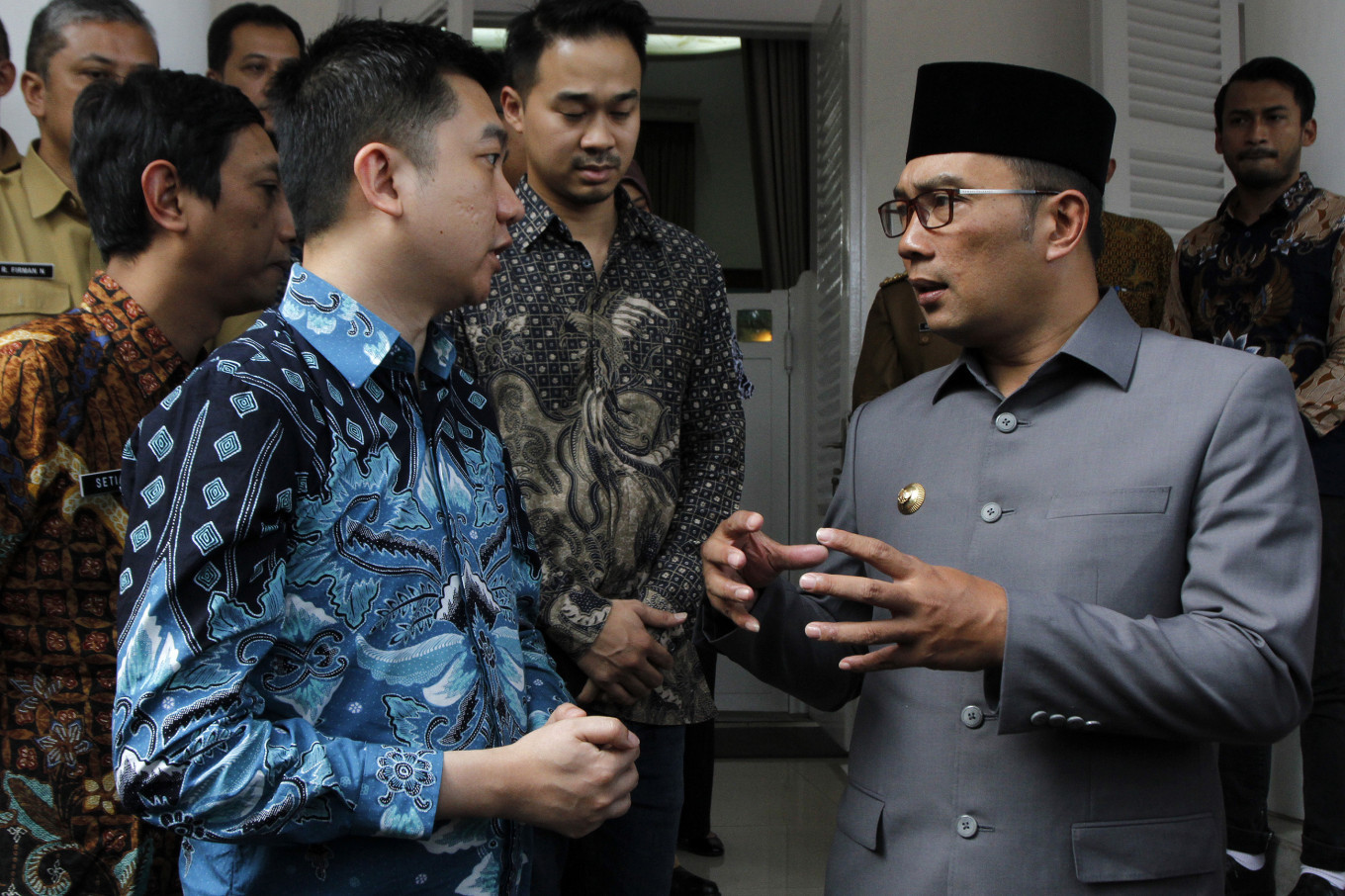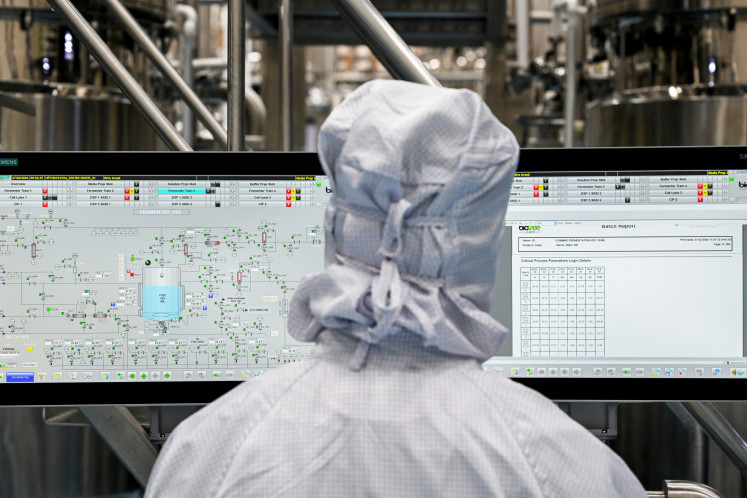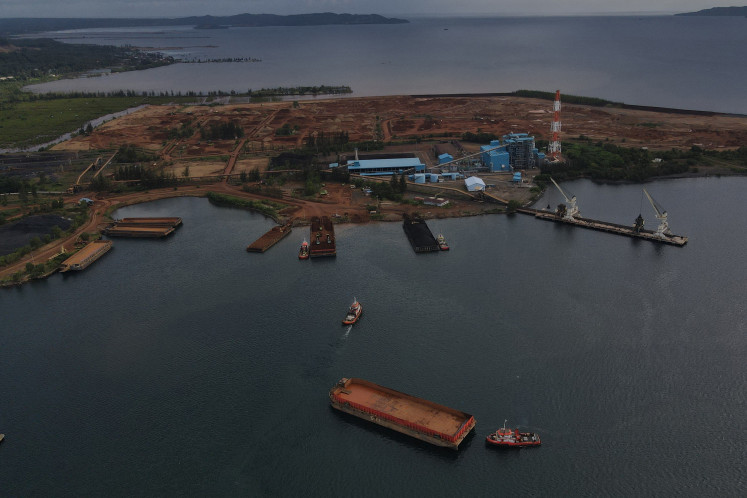Popular Reads
Top Results
Can't find what you're looking for?
View all search resultsPopular Reads
Top Results
Can't find what you're looking for?
View all search resultsTrade, infrastructure and investment key to ASEAN’s economic resilience
Indonesia has traditionally relied on consumption to drive its economic growth.
Change text size
Gift Premium Articles
to Anyone
 West Java Governor Ridwan Kamil (right) discusses with Tokopedia's CEO, William Tanuwijaya and his team after signing a memorandum of understanding related to the development of digital villages via the Tokopedia Center ecosystem and the Digitalization of Public Services in Genug Pakuan, Bandung, Tuesday (8/20). The Tokopedia application is currently visited by up to 90 million people every month with transactions reaching Rp18 trillion each month or reaching one percent of the Indonesian economy. -JP / Arya Dipa / Adi / 19 (JP/Arya Dipa)
West Java Governor Ridwan Kamil (right) discusses with Tokopedia's CEO, William Tanuwijaya and his team after signing a memorandum of understanding related to the development of digital villages via the Tokopedia Center ecosystem and the Digitalization of Public Services in Genug Pakuan, Bandung, Tuesday (8/20). The Tokopedia application is currently visited by up to 90 million people every month with transactions reaching Rp18 trillion each month or reaching one percent of the Indonesian economy. -JP / Arya Dipa / Adi / 19 (JP/Arya Dipa)
W
ith vaccines on the horizon and the first green shoots of economic recovery already starting to show across Asia, Indonesia’s future is looking brighter than it has for months, but if we must be proactive if we are to make the most of the opportunities that are appearing to return to sustainable growth.
Indonesia has traditionally relied on consumption to drive its economic growth, but if we are to turbocharge our recovery we need to boost trade and investment by reducing costs, barriers and bottlenecks.
Although COVID has been brutal, the Indonesian economy has been less scarred than many of our more tourism-dependent neighbors and with the right policies can be expected to bounce back strongly as the recovery spreads regionally and globally.
The government has made a strong start. Last year, Indonesia signed the Regional Comprehensive Economic Partnership agreement, and more recently the switch from a ‘negative list’ of industries which are barred to foreign investors to a ‘priority list’ of industries which attract tax breaks and relaxed licensing procedures will add to the country’s attractions as a trade and investment destination.
Those attractions add to our natural head start in the race for investment: Indonesia is a relatively cheap production base with a vast pool of domestic customers.
And not only are there few signs that global value chains breaking down, or the reshoring that many doomsayers predicted when COVID struck, but we are also seeing companies move production capacity closer to their customers. Given Asia’s population and growth trajectory, that means they are keener than ever to move manufacturing to the region.
These are encouraging signs, but they are not enough on their own. If we are to lean in to the recovery the government, the financial sector and companies will need to do more.
We need to find ways to further cut the costs and barriers that discourage companies and entrepreneurs from funneling sustainable investment in Indonesia, or trading into and out of the country.
ASEAN has done important work in reducing tariff barriers, but significant non-tariff barriers remain. The EU-ASEAN Business Council estimates that there are now some 6,000 separate non-tariff barriers to trade across the region. A 2019 IMF study estimated that if Asia could remove barriers to trade and foreign direct investment, it would boost regional growth by 15 percent.
These issues are politically and diplomatically difficult to tackle, but unless the thickets of special-case exemptions to free trade can be tamed, they will continue to limit South East Asia’s attempts to realize its full potential.
This is especially true when it comes to trade in data. There are vast potential economies of scale when it comes to extending new advanced financial technology across the region. Southeast Asian companies like Gojek and Grab have been hugely successful, but the realization of the benefits that they and others including traditional banks like HSBC can bring in terms of financial inclusion and business opportunities will always depend on transnational regulations that allow them to shuttle data across frictionless borders.
We should aspire to something more than a return to business as usual, or even growth as usual. An unsustainable recovery is a contradiction in terms. As we rebuild our economy, investment must be directed towards phasing out polluting industries and funding new projects that build in strong environmental protections. Indonesia needs to gradually shift to more sustainable exports to grow alongside the world economy.
The decisions Indonesia takes today will determine its growth trajectory for years if not decades to come. Creating a green economy boosted by free and transparent trade with its neighbors in Asia and beyond is the best way of recovery today and sustainable growth tomorrow.
***
The writer is president director of PT Bank HSBC Indonesia.









